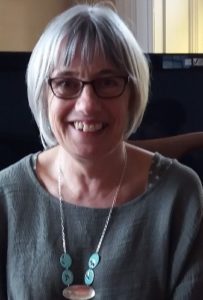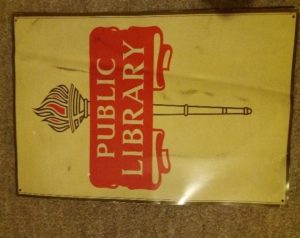Annette Thain, NHS Education for Scotland
Category: Meet our Members
This blog is part of our Meet our Members series, focusing on different members and their careers.
My name is Annette Thain. I have worked in the health sector for most of my career and in NHS Education for Scotland since 2003 in a range of posts. A year ago, I was appointed Principal Lead in the new Knowledge Management and Discovery Business Unit within the Digital Directorate and I have been in the fortunate position of working with the teams to shape the unit and define its vision. We support both practice and learning in the health and social care sector in Scotland by providing access to resources and promoting the skills to find, share and use knowledge. This is through the delivery of the Knowledge Network www.knowledge.scot.nhs.uk and digital library, the national library management system, a learning management system (Turas Learn), building eLearning modules and outreach activities.
Since moving into my new role I have been on a steep learning curve taking on new responsibilities. For example, I had to negotiate three-year contracts to provide national digital library subscriptions with a budget reduced by 25%. At the same time, I have discovered the highs and lows of using Agile methodology to deliver a learning management system. The importance of good information management is as key for this system as it is for the digital library. I am fortunate to work with 16 enthusiastic professional librarians who have a wide range of expertise. This covers knowledge management, information systems, information management, outreach, training, user support, eLearning, all committed to the continuous improvement of the services we deliver.
As it is a digital library service we provide we rely on everyone working in NHS Scotland library services to help the users locally. To support this, we facilitate a national network of librarians to share ideas and experiences. This includes hosting face to face meetings, monthly webinars and ‘Expert in the Room’ webinars. When I first moved to NHS Education for Scotland and an office environment I remember I missed being surrounded by books and the direct interaction with the users.
I am a member of the Scottish Health Literacy Action Planning Group where I promote the role of librarians in supporting health literacy skills. These are increasingly recognised as important if clinicians are to deliver shared decision making with patients. Whatever our profession, we use a lot of jargon and it is important to be remember that this is can be quite a barrier to communication and a shared understanding.
A key turning point for me some years ago was when I realised that it was not enough just to promote evidence from published literature but, that in order to improve practice, we needed to find ways the published evidence can be easily combined with experience and the context. In NHS Scotland the ‘Knowledge into Action Implementation Plan’ 2012-16 helped raise the profile of the librarians to connect these three sources of evidence. I am passionate about furthering the role of librarians to promote and support knowledge mobilisation and especially the principles of communities of practice. I was fortunate to have attended the UK Knowledge Mobilisation Forum in March 2019 and really appreciated the opportunity to share ideas and hear from others about their experiences. The highlight was listening to John Gabbay and Andree le May talk about their research journey and findings as this encapsulated many of the aspects of knowledge mobilisation that we had discussed at the conference.
It is important that I try to keep up to date with both national healthcare policies and trends within knowledge mobilisation. I find Twitter a useful tool for this (@athain) and I also value my membership of CILIPS.
I was introduced to the world of librarianship as an 18year old when I found myself working in Argyll & Bute Public Libraries. I am regularly reminded of this job as I still have this old sign I found buried in the library cupboard. What a sad person I am!
Our daily tasks have changed significantly since the time I enrolled in Robert Gordons in Aberdeen way back in 1976. I remember sitting patiently waiting for up to an hour for a connection to the USA to conduct a database search. At that time, we could never have imagined the technical revolution that was around the corner.
After qualifying I wanted to work in special libraries and following a couple of posts in private companies I got a job in Chelsea and Westminster Hospital libraries. On moving back to the west of Scotland I was fortunate to get the opportunity to set up a library service for the Beatson Oncology Centre in Glasgow. I went on to work part time there for about 10 years while my two boys were young.
Around 2001 Dr Ann Wales, at that time librarian at Glasgow Royal Infirmary encouraged me to apply for a Research in the Workplace Award (RIWA) which really started me on a new path. Ann was a huge influence with her energy and passion for the role of the librarians in the health service. Her vision of how librarians can help health and care practitioners use knowledge to inform their practice has changed the roles of librarians in NHS Scotland.
A few years ago, I was privileged to visit Zambia with Ann Wales to support a project to improve the access and use of knowledge to inform practice in a rural hospital. We left Glasgow airport with huge suitcases full of books, wind up torches and mobile devices loaded with eBooks. The nurses from rural clinics travelled to the Chitambo hospital for the training and we in turn visited a couple of the clinics to see the conditions for ourselves. A trainee nurse in her early 20s told me that it was not unusual for her as the only person on duty to deliver babies with the light from a torch. The enthusiasm and commitment of all the people we met was truly inspiring. We had a fantastic 10 days sharing ideas of knowledge brokering with librarians and clinical staff.
I have used or, thought about using, the word ‘facilitate’ a lot in this blog post and I think that is probably the key skill for librarians these days as is about bringing people together as well as the information.

